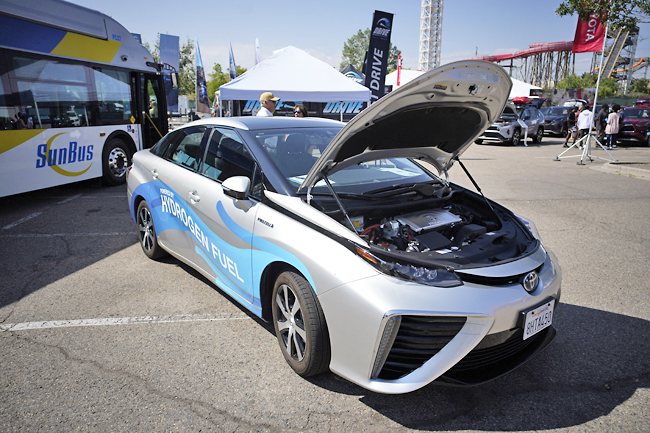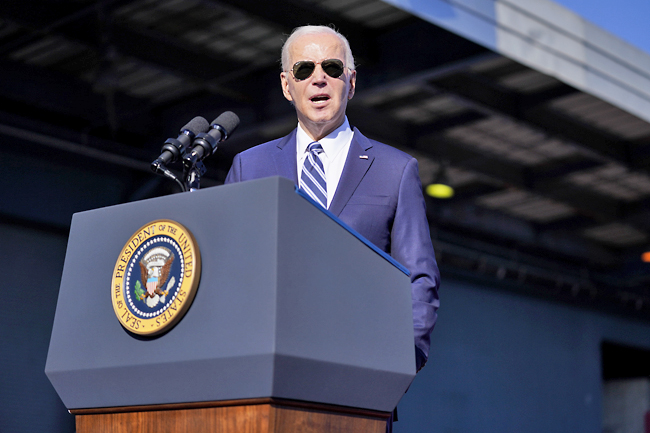WASHINGTON (AP) – The Biden administration has selected clean-energy projects from Pennsylvania to California for a USD7 billion programme to kickstart development and production of hydrogen fuel, a key component of President Joe Biden’s agenda to slow climate change.
Biden called clean hydrogen essential to his vision of net-zero greenhouse gas emissions in the United States (US) by 2050. His goal is to establish seven regional hubs to help replace fossil fuels such as coal and oil with cleaner-burning hydrogen as an energy source for vehicles, manufacturing and generating electricity.
The seven hubs, which include projects in 16 states, will spur more than USD40 billion in private investment and create tens of thousands of good-paying jobs, many of them union positions, Biden said on Friday at a cargo terminal in Philadelphia, where one of the hubs will be based.
He called the announcement transformational and said it would help create “a stronger, energy-secure economy” and combat “the existential threat of climate change”.
The projects selected are based in California, Washington, Minnesota, Texas, Pennsylvania, West Virginia and Illinois. All but the California and Texas hubs include projects in multiple states.
The infrastructure law Biden signed in 2021 included billions of dollars to develop so-called clean hydrogen, a technology that industry and clean-energy advocates have long pushed as a way to reduce planet-warming greenhouse gas emissions produced by fossil fuels. Some environmentalists call hydrogen a false solution because it frequently relies on natural gas as a fuel source.


Energy companies said fossil fuels can by used if the projects capture the carbon dioxide produced and keep it out of the atmosphere, a technology that has yet to be produced at commercial scale.
States and businesses have been competing for federal dollars in the new Energy Department programme, which will create regional networks of hydrogen producers, consumers and infrastructure. The intent is to accelerate the availability and use of the colourless, odourless gas that already powers some vehicles and trains.
Among those selected were the Appalachian Regional Clean Hydrogen Hub, based in West Virginia, and the Philadelphia-based Mid-Atlantic Clean Hydrogen Hub. The two largest projects are in California and Texas; each will receive up to USD1.2 billon.
The Alliance for Renewable Clean Hydrogen Energy Systems in California will produce hydrogen from renewable energy and biomass. The project is intended to provide a blueprint for decarbonising public transportation, heavy-duty trucking and port operations – key emissions drivers in the state and major sources of air pollution.
In order to achieve ambitious climate goals, “we have to address these intensive industries”, including ports, aviation, shipping and agriculture, as well as large power plants and cement and steel plants, California Governor Gavin Newsom said on Friday.
Nearly every state had joined at least one proposed hub, and many have been working together, hoping to reap the economic development and thousands of jobs they would bring.
Big fossil fuel companies, renewable energy developers and researchers in university and government labs are involved, too.
Environmental groups are sceptical, arguing that while hydrogen is a clean-burning source of power, it takes a great deal of energy to produce. When made with electricity from coal or natural gas, it has a bigger carbon footprint than simply burning the source fuel.
“We need guardrails to ensure that US hydrogen does not create an emissions mess, and that we are not subsidising hydrogen that is clean in name only,” said federal hydrogen advocate Erik Kamrath at Natural Resources Defense Council, an environmental group.
Senior hydrogen hubs manager Anna Menke at Clean Air Task Force, another environmental group, called the new hubs “a critical first step” to reduce emissions from carbon-intensive industries such as ammonia used for fertilisers and petrochemicals used in refining.
New uses of hydrogen in sectors such as heavy-duty trucking, shipping and aviation are potential game changers, she said, adding: “We must ensure the programme delivers on these promises.”





